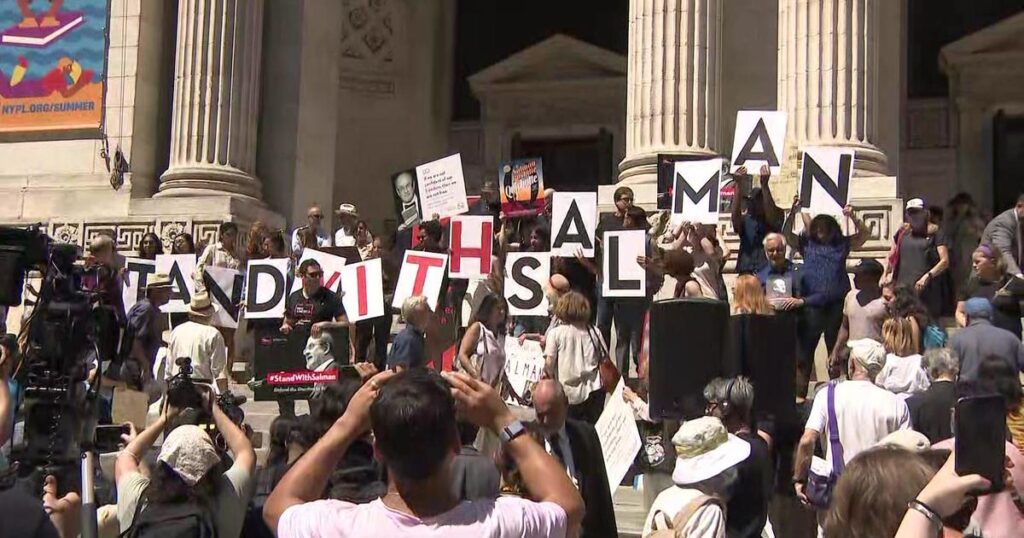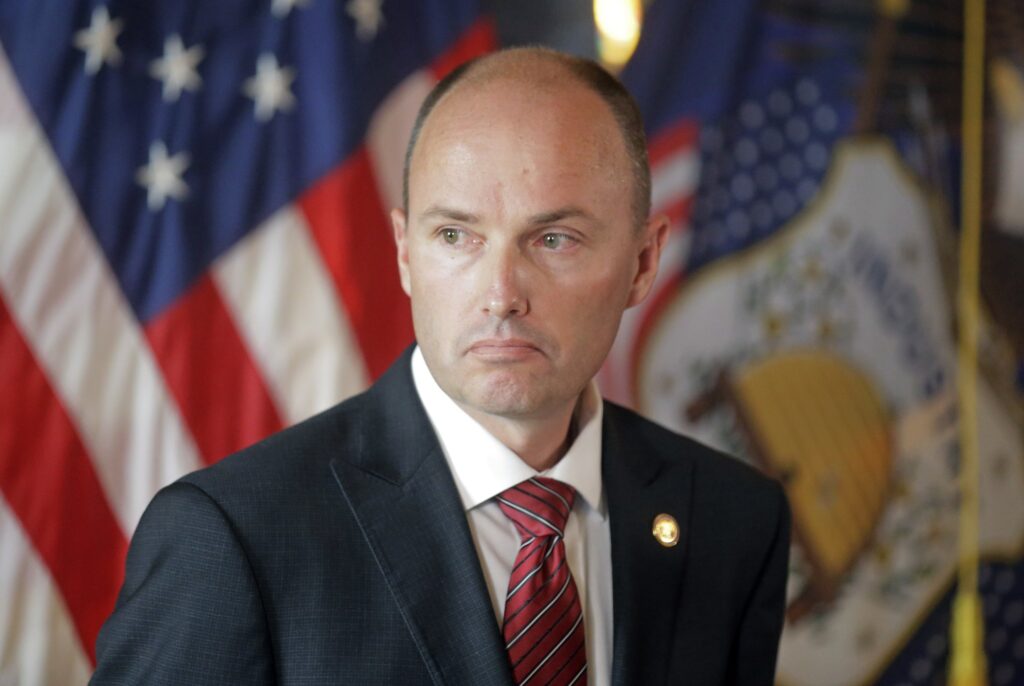The venerable New York Public Library – you probably have seen a photo of the library with its two massive marble lions guarding the entrance – hosted an event recently to show support for Salman Rushdie, the British-American writer who narrowly survived an assassination attempt two weeks ago.
Rushdie became a political target after the publication of his 1988 novel The Satanic Verses, a work of fiction that features a dream sequence involving the Prophet Muhammad that the supreme leader of Iran at the time declared blasphemous.

Ayatollah Ruhollah Khomeini, the Iranian leader who engineered that nation’s revolution in the late 1970s, never read Rushdie’s book, the journalist Robin Wright confirms. Nevertheless, for largely political reasons, the Ayatollah ordered death for a writer. For years thereafter Rushdie lived a life of isolation, surrounded by bodyguards. Years later he assumed a more public life, and nearly died as a result.
Wright, who has covered the Middle East for years, recently wrote that “Khomeini often capitalized on issues that distracted public attention from the Revolution’s fissures and failures. He had done the same thing after students took over the U.S. Embassy in 1979. In the months after the Shah was ousted, the revolutionaries split over Iran’s political future, a new constitution, and the powers of the clergy. (They also started killing one another.) The Embassy takeover provided a useful diversion.”
So, too Rushdie’s book. It was all political.
The attack on a writer by a knife wielding assailant is a good a reminder of what political and religious zealots determined to destroy fundamental personal freedoms are capable of. Rushdie nearly died after ten stab wounds that will likely cause him to lose an eye, severed nerves in his arm and damaged his liver.
The attack is an extreme example of the kind of anti-intellectual craziness and free speech denialism that is now running wild in the United States. Threats to personal freedoms, like the freedom to check out a particular book at your local library, a right we once took for granted, are under broad assault.
Librarians, as a class, the nicest, most caring and interesting people in every community, are under attack. School boards are facing down angry, and wildly misguided parents who demand that books be banned.
Some political candidates, ironically the Republican Senate candidate in Ohio, J.D. Vance, a best-selling author, are applying ridiculous restrictions on reporters covering their public events.

Vance held a rally recently with Florida’s book banning governor, Ron DeSantis. Reporters were told they could cover the event only if they agreed to a list of conditions, including not interviewing anyone in attendance.
The editor of the Cleveland Plain Dealer called b.s.: “Think about what they were doing here. They were staging an event to rally people to vote for Vance while instituting the kinds of policies you’d see in a fascist regime. A wannabe U.S. Senator, and maybe a wannabe president.” Appropriately Vance and DeSantis got the bad publicity they deserve.
The GOP lieutenant governor of North Carolina wants to go farther. Mark Robinson, a likely candidate for governor in two years, says he’d abolish the state board of education and eliminate science and history education in elementary schools. “In those grades, we don’t need to be teaching social studies,” Robinson writes. “We don’t need to be teaching science. We surely don’t need to be talking about equity and social justice.”
The religious zealot and free speech deniers are literally everywhere. “For months,” NBC News reports, “a group of conservative Christians have inundated the staff and board of a public library in Bonners Ferry, Idaho, with complaints about books they didn’t want to see on the shelves.
“Their list of more than 400 titles predominantly focuses on young adult books with LGBTQ characters, scenes describing sexual activity or invoking the occult.”
Ayatollahs are alive and well in Boundary County, Idaho. None of the 400 books are even in the library. These zealots want to pre-emptively ban books, which you can be certain, like the Ayatollah, they haven’t taken the trouble to read. If they don’t like “young adult books with LGBTQ characters,” they shouldn’t read them. But the zealot’s real aim is to restrict your choice, your freedom of action, to think for you.
And, of course, they seek to intimidate and frighten. The Boundary County librarian, Kimber Glidden, resigned saying, “Nothing in my background could have prepared me for the political atmosphere of extremism, militant Christian fundamentalism, intimidation tactics, and threatening behavior currently being employed in the community.”
At the Keller Independent School District near Fort Worth, Texas, more than 40 books were ordered off the library shelves, including the Bible and an illustrated book based on Anne Frank’s diary, because someone complained.
Seriously? The Bible? Anne Frank?
One Texas parent got to the heart of the matter. Laney Hawes, parent to four children, said she understood that some parents might not approve of some materials for their children, and perhaps for very good reason, but why ban books that another parent might deem appropriate for their child?
“I don’t think that certain materials that you don’t feel like are appropriate for your children should be withheld from my children, too,” she said. Exactly.
Andrew Solomon, a free-speech activist who spoke at the New York library rally supporting Salman Rushdie, put a fine point on the threats to personal freedom the book banners and free speech tramplers engage in. “We are living at a time when the right of free speech has been under constant assault from both the left and the right,” Solomon said, “when there have been closures of libraries, books removed from schools, when everything that used to be tokens of America’s freedom of speech is under threat.”
Like Khomeini’s death order against Salman Rushdie, the American book banners and thought police are acting on a zealous religious and political agenda. They want to shape how you think, what you read, what you say and what you believe. They don’t trust you to make decisions for yourself.
This is real. Act on these threats, as more than 200 people did recently in Meridian, Idaho when they showed up to support their local library after zealots demanded book bans.
Act. Show up. Pay attention. Don’t let them censor and ban. You won’t know what you’ve lost until its gone.
—–0—–
Suggestions for further reading:
Trump “Will Be Indicted”
“As the former president faces legal investigations, the author and white-collar-crime scholar Jennifer Taub identifies the probe that’s furthest along, what January 6 Committee graphic was key, and why you can’t get a toupee in federal prison.”
Informed speculation here from Washington Monthly:
The Red-State Governor Who’s Not Afraid to Be ‘Woke’
I found this TIME magazine piece on Utah Governor Spencer Cox to be fascinating.

“In April 2021, just a few months into his governorship, Cox held a virtual town hall with students across the state. Midway through, a senior from Utah’s rural southwest corner asked what he planned to do about the high rates of suicide and mental illness affecting LGBT youth. The girl identified herself as bisexual and gave her pronouns as ‘she/her/hers.’ In response, Cox said, ‘My preferred pronouns are he/him/his, so thank you for sharing yours.’ Cox had previously chaired a teen-suicide task force and championed hate-crime and nondiscrimination legislation, and he responded to the question by talking about the importance of increasing both mental-health services and societal acceptance. ‘You do belong, you do matter, no matter what you might be feeling,’ he said.”
Read the piece by Molly Ball here:
How Britain Built an Empire of Fraud
How the Brits built a financial haven for oligarchs.
“There is no clearer indication that Britain has lost its way, politically, economically, strategically, and ethically, than the outgoing occupant of 10 Downing Street. We have had good prime ministers and bad prime ministers, but never before a totally unprincipled opportunist and self-seeking mountebank, and it’s fair to say that, until recently, a man of Boris Johnson’s character and conduct could not possibly have become prime minister.”
Geoffrey Wheatcroft reviews a new book and also takes the hide off the British ruling class.
The century of climate migration: why we need to plan for the great upheaval
Sorry. This won’t improve your outlook for the weekend. A great upheaval is coming.
“The world already sees twice as many days where temperatures exceed 50C than 30 years ago – this level of heat is deadly for humans, and also hugely problematic for buildings, roads and power stations. It makes an area unliveable. This explosive planetary drama demands a dynamic human response. We need to help people to move from danger and poverty to safety and comfort – to build a more resilient global society for everyone’s benefit.”
A long read from The Guardian. You’ve been warned.
On that happy note – that’s all I got. Be well. Read books. Protect librarians.













